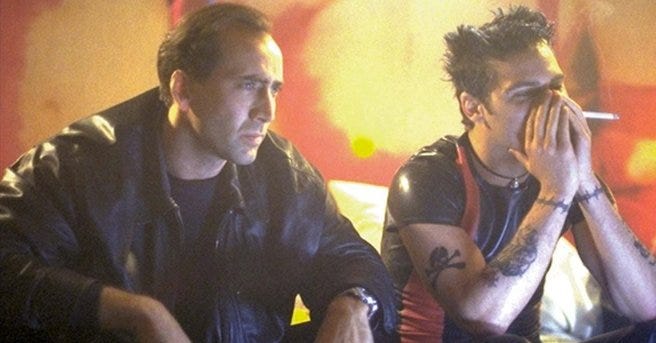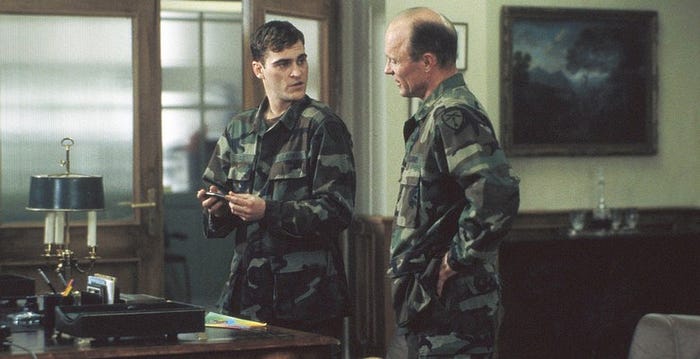
So around a year ago I decided it’d be a good idea to try and watch every Joaquin Phoenix film, and here I am now trying to figure out what to do with my life now that I have watched every Joaquin Phoenix film. I think the whole enterprise raises two main questions, the first being ‘why?’ (addressed separately) and the other being ‘how was it?’
As much as I enjoyed doing this, I’m not sure it’s exactly the sort of thing one would expect anyone else to do, ever, and so I am sharing the wisdom I have gained from watching every Joaquin Phoenix film so that you don’t have to, namely which ones are worth watching.
I watched 31 movies in total — sticklers will note that Phoenix in fact has more than 31 film credits, but I discounted:
- documentaries, on the grounds that I was only interested in deepening my knowledge of Joaquin Phoenix the actor;
- short films, because he had only made one at the time I decided to do this;
- anything he made as a child actor, because nobody should be judged on things they did as children, and also they’re technically not Joaquin Phoenix movies if he’s credited as Leaf Phoenix.
LESSON 1: Joaquin Phoenix has always been a Big Deal.
The first big takeaway from the remaining 31 is that Joaquin Phoenix is clearly a valuable resource that filmmakers want to get their money’s worth from: he has ‘starring’ billing in everything I watched, although if I were being a purist I’d maybe strip the list down to a round 30 as he has barely any screentime in Hotel Rwanda, compared to some of the African actors like Desmond Dube and Fana Mokoena that he’s billed above. He also has less screentime in U-Turn, Return to Paradise and The Village although all of those are memorable, plot-integral characters compared to Hotel Rwanda, and in absolutely everything else he is unquestionably a Star, if not always The Star.
LESSON 2: Joaquin Phoenix is typecast a lot.
Another thing that becomes clear after watching ten or so Joaquin Phoenix movie is how easily most of his roles fit into a few distinct categories, that can be plotted out thusly, illustrating why Joker was, in the eyes of the Academy, the Perfect Joaquin Phoenix Role:

The other common dynamic that this chart doesn’t quite capture is the frequency with which he is cast as characters who either implicitly or explicitly cannot read. In fact, I think the only times in which his character is confirmed good at reading are in Quills, Irrational Man, 8MM and Her, and most of these are not considered amongst his most iconic roles.
LESSON 3: The hit:miss ratio of his movies is roughly 1:1
Unfortunately my initial thesis — that Phoenix’s undeniable charisma and talent combined with all these major roles would mean even the overall mediocre films would be worth it on the strength of Joaquin alone — collapsed from the very start, and in the end it worked out that only about half of them are worth watching unless you are trying to watch every Joaquin Phoenix movie for some reason. As I worked through the list I kept track of how each film compared to my initial expectations, meaning a few stand out for how much better or worse they were than I’d expected:
MOVIES THAT WERE SIGNIFICANTLY BETTER THAN I THOUGHT THEY’D BE: Don’t Worry, He Won’t Get Far on Foot; The Village; Hotel Rwanda, Quills
MOVIES THAT WERE SIGNIFICANTLY BETTER THAN I THOUGHT THEY’D BE BUT WERE STILL NOT GREAT: Inventing the Abbotts, Brother Bear
MOVIES THAT WERE SIGNIFICANTLY WORSE THAN I THOUGHT THEY’D BE: The Sisters Brothers, Mary Magdalene, Her, The Yards
MOVIE THAT SUCKED EXACTLY AS MUCH AS I THOUGHT IT WOULD: Ladder 49
MOVIE THAT WAS EXACTLY AS GREAT AS IT LOOKED: 8MM

I also took the time to plot out all of the movies I’d watched based on the other very important metric of whether or not Joaquin Phoenix is hot in any given movie in which he appears, and fascinatingly it turns out that the split of hot/not hot Joaquin roles is also around 50:50.

I should point out that, Joaquin Phoenix being an extremely hot man, the left half of this chart is less ‘movies where he’s actively unattractive’ than ‘movies where he isn’t distractingly hot/being extremely hot is not a key feature of his character’, also that I think I put Signs and Return to Paradise/U-Turn backwards on the x axis but there is absolutely 0 chance of me starting over from scratch in Preview to correct this.
Anyway, the takeaway here is that the movie that performs the best in both very important metrics is Buffalo Soldiers. A straight-up treat bestowed upon us by Film4, a zany reimagining of Brecht’s Threepenny Opera, a film so anti-American it had to be cancelled due to 9/11 — and also a movie where a peak smokin’ Joaquin and Anna Paquin do pills in a West Berlin nightclub to Blue Monday. It’s absolutely a film that has to be seen to be believed, nobody has seen it because of the aforementioned 9/11 cancellation, and I probably would never have watched it, let alone known it existed, if not for attempting to watch every Joaquin Phoenix film, which is the sort of thing that makes the whole enterprise worthwhile. I mean, if not for this I’d just have come out of it thinking the best film where Joaquin Phoenix is also hot is The Master, which is not exactly a groundbreaking opinion.

LESSON 4: Her is the nadir of Joaquin Phoenix’s career.
Of course, there is no point in writing about something on the internet unless you have some excitingly controversial takes to contribute, so I will close out my reflections with this zinger: what everyone thinks of as Joaquin Phoenix’s ‘renaissance’ period is actually his career low point.
In a non-controversial view, looking back from 2020 allows you to conceive of Phoenix’s career in four distinct chunks, as follows:
- 90s Phoenix, carving out the sort of edgy/slacker/possibly illiterate roles he’s known for in a variety of strange and low-budget films of wildly inconsistent quality, mostly failing to live up to the very high benchmark set in Van Sant’s To Die For;
- Starting with his casting in Gladiator, an early-00s period of straight up stardom, taking on an impressive range of genres in a sort of chocolate-box-y fashion: some of his roles in this period are unquestionably awful but there is also unquestionably Something For Everyone here, from a Disney cartoon to some proper indie oddities (most notably the aforementioned Buffalo Soldiers) to some nauseatingly reactionary post-9/11 trash. This era is of course epitomised and also ended by Walk the Line, a film that pretty much everyone loves;
- A few fallow years, entirely understandable in light of this being the period of his life where he was saved from otherwise certain self-immolation by a somewhat angelic Werner Herzog (ps: in the mortifying event that Herzog or Phoenix reads this, please collab): a small number of films, none particularly remarkable either way, made by directors he’d worked with before, but of course also his most audacious role, performing a spectacular public decline for I’m Still Here;
- A kind of arthouse renaissance after the I’m Still Here bit damaged his mainstream appeal, taking on only carefully considered, interesting projects and gradually building up his reputation as The Thinking Person’s Favourite Actor until finally breaking back into normie consciousness with Joker, a film that for some reason everyone on the planet has seen.
On closer inspection though the final period is in my opinion better divided in half, which appeals to my sense of order (a 25-year career in five roughly-five-year chunks) but also reveals the nuance of the first half of the 2010s featuring the longest run of bad movies in his entire career. I accept that this is a minority view: according to the horrible, tasteless goblins that make up the rest of the Letterboxd community, Her is Phoenix’s highest-rated film; the same is true at Rotten Tomatoes, where it holds a 95% positive rating.
Momentarily putting aside the extremely dodgy sexual politics of Her, a film about a man who shags his phone, I think its weaknesses come across very clearly compared like-for-like with the Master: both are essentially love stories about the coming together and splitting up of people who are unable to provide what the other needs; in both Amy Adams plays a hugely important ‘third billing’ role, balancing the central love story. But while the characters in Her are sad, pathetic, lonely, they lack the dimension of danger and cruelty that makes Freddie and Dodd so three-dimensional and close to home in the Master. Her is too comfortingly, even patronisingly straightforward and flat: it makes sense, maybe, that these are the kind of people that would fall in love with a robot, but it doesn’t seem to be interested in interrogating that.
As for the rest of his early-aughts run, The Immigrant is victim to a suffocating melodrama — a failure to imagine its characters capable of happiness that robs their on-screen suffering of impact. That Anderson’s direction in Inherent Vice is beautiful is undeniable, as is Phoenix’s charm, but they fail to strike gold a second time: it sags under the weight of the source material, accurately capturing the feel of a Pynchon novel while also reminding you why his kind of books are considered unadaptable. I don’t think I need to elaborate on why Irrational Man — a film so simultaneously loathsome and incompetent it makes it difficult to imagine ever having thought Woody Allen had redeeming qualities — sucks, and I assume the two-year break that followed it involved Phoenix thinking hard about what he’d done.
Taken with the fact that I’m Still Here is objectively one of the greatest things he’s ever done, I would therefore propose it together with the Master as a high point followed by the true low. This opens his redemption arc with You Were Never Really Here, not only a perfect film but also a perfect ‘redemption’ film, heavy with Messianic themes. It also marks the start of a busy period — five films in three years, all of them interesting and only Mary Magdalene actively unenjoyable. I am definitely curious to see where the success of Joker takes him: I can just as easily see the presumably insane amount of money it made giving him the safety net to focus on activism and take a discerning, Daniel Day-Lewis ‘one movie every five years’ approach to the rest of his career as I can see him making a return to the mainstream, older and wiser but as charismatic as ever.
However it pans out, I’m sure that my Year of Joaquin will have entered me into a contract for life; even in the worst possible timeline I will be here dutifully documenting my thoughts on the questionable decision to Irishman a 60-year-old Phoenix into his own teenage son for 2035’s Joker 5: Joker Jr, on whatever Netflix-Amazon-Disney-merger-approved platform succeeds the low-ambition charm of Letterboxd. As long as Joaquin’s still here, I am too.
